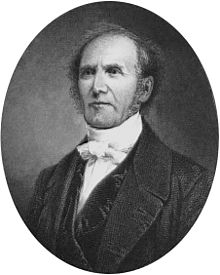Gardiner Spring
| Gardiner Spring | |
|---|---|
 |
|
| Born | February 24, 1785 |
| Died | August 18, 1873 (aged 88) |
| Signature | |
Gardiner Spring (February 24, 1785 – August 18, 1873) was an American minister and author.
Spring was born on February 24, 1785, in Newburyport, Massachusetts, the oldest child of the politically well-connected Reverend Samuel Spring. His parents directed him towards the ministry, which he initially resisted.
He attended grammar school in Newburyport, but he was also privately tutored by Chief Justice Parsons. At the age of 15, he entered Yale College, where he became the class-mate of John C. Calhoun, and was one of the oldest graduates of that celebrated institution, delivering the valedictory address at the Commencement exercise in 1805. He did not then appear to incline toward the Church, and on leaving college pursued the studies of law in the office of Judge Daggett, in New Haven. The principal portion of his time, however, was occupied in teaching, and he established an English school in the Bermuda Islands, where he spent fifteen months. He was admitted to the Bar in 1808, and commenced practice under favorable auspices, but he subsequently abandoned the profession against the wishes of his wife, whom he married in 1803, and declared his intention of becoming a minister. This sudden change he himself attributed to the effect of a sermon preached by the Reverend John Mason, in New Haven, from the text, "To the poor the Gospel is preached". He described the impression the discourse produced as miraculous; he could not restrain from tears, and from that moment he followed the ministry with zeal and piety.
Spring spent one year at Andover Theological Seminary, and was ordained in 1809. After receiving calls from several New England parishes he preached in Cedar-street Church in the following spring, and in the same year, by unanimous call, was invited to the pastorate of the old Brick Church on Beekman street in New York City. Spring frequently received calls of higher trust and responsibility, including the presidencies of Dartmouth and Hamilton colleges, but he did not desire to abandon his first field of labor, and during the sixty-three years of his pastoral care of that church he was regarded as second to no preacher in this city. His congregation moved to Murray Hill in 1851, and in the following year he accepted as his associate Rev. Wm. G. T. Shedd.
...
Wikipedia
